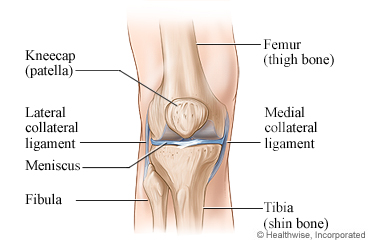Knee Arthroscopy: Before Your Surgery

What is knee arthroscopy?
Arthroscopy is a way to find problems and do surgery inside a joint without making a large cut (incision). Your doctor puts a lighted tube with a tiny camera and surgical tools through small incisions in your knee. The camera is called an arthroscope, or scope.
In this surgery, your doctor may:
- Remove or repair a torn piece of cartilage or loose bone.
- Replace a torn anterior cruciate ligament (ACL) tear with a piece of tissue. This repair is called a graft.
- Remove inflamed tissue.
Most people go home on the day of the surgery or the next day. If you have a simple injury, it may take at least 6 weeks to recover. It may take longer if your doctor had to repair damaged tissue. You will need to limit activity while your knee heals. You may need to have physiotherapy (rehab) to help your knee get stronger.
If you have a desk job, you may be able to go back to work a few days after treatment of a simple injury. If you lift things or stand or walk a lot at work, it may be a few weeks to a few months before you can go back.
After surgery and rehab, you will probably have less pain. Your knee should be stronger. You should be able to use your knee and leg better. Some people have to avoid lifting heavy objects.
How do you prepare for surgery?
Surgery can be stressful. This information will help you understand what you can expect. And it will help you safely prepare for surgery.
 Preparing for surgery
Preparing for surgery
- You may need to shower or bathe with a special soap the night before and the morning of your surgery. The soap contains chlorhexidine. It reduces the amount of bacteria on your skin that could cause an infection after surgery.
- Be sure you have someone to take you home. Anesthesia and pain medicine will make it unsafe for you to drive or get home on your own.
- Understand exactly what surgery is planned, along with the risks, benefits, and other options.
- Tell your doctor ALL the medicines and natural health products you take. Some may increase the risk of problems during your surgery. Your doctor will tell you if you should stop taking any of them before the surgery and how soon to do it.
- If you take a medicine that prevents blood clots, your doctor may tell you to stop taking it before your surgery. Or your doctor may tell you to keep taking it. (These medicines include aspirin and other blood thinners.) Make sure that you understand exactly what your doctor wants you to do.
- Make sure your doctor and the hospital have a copy of your advance care plan. If you don't have one, you may want to prepare one. It lets others know your health care wishes. It's a good thing to have before any type of surgery or procedure.
What happens on the day of surgery?
Follow the instructions exactly about when to stop eating and drinking. If you don't, your surgery may be cancelled. If your doctor told you to take your medicines on the day of surgery, take them with only a sip of water.
Take a bath or shower before you come in for your surgery. Do not apply lotions, perfumes, deodorants, or nail polish.
Do not shave the surgical site yourself.
Take off all jewellery and piercings. And take out contact lenses, if you wear them.
At the hospital or surgery centre
Bring a picture ID.
The area for surgery is often marked to make sure there are no errors.
You will be kept comfortable and safe by your anesthesia provider. You may be asleep or have medicine to relax you. And the area will be numbed if you're awake. It's often numbed even if you are asleep.
The surgery will take about 1 to 2 hours. It depends on how much repair needs to be done to your knee.
When should you call your doctor?
- You have questions or concerns.
- You don't understand how to prepare for your surgery.
- You become ill before the surgery (such as fever, flu, or a cold).
- You need to reschedule or have changed your mind about having the surgery.
Where can you learn more?
Go to https://www.healthwise.net/patientEd
Enter I038 in the search box to learn more about "Knee Arthroscopy: Before Your Surgery".
Current as of: July 31, 2024
